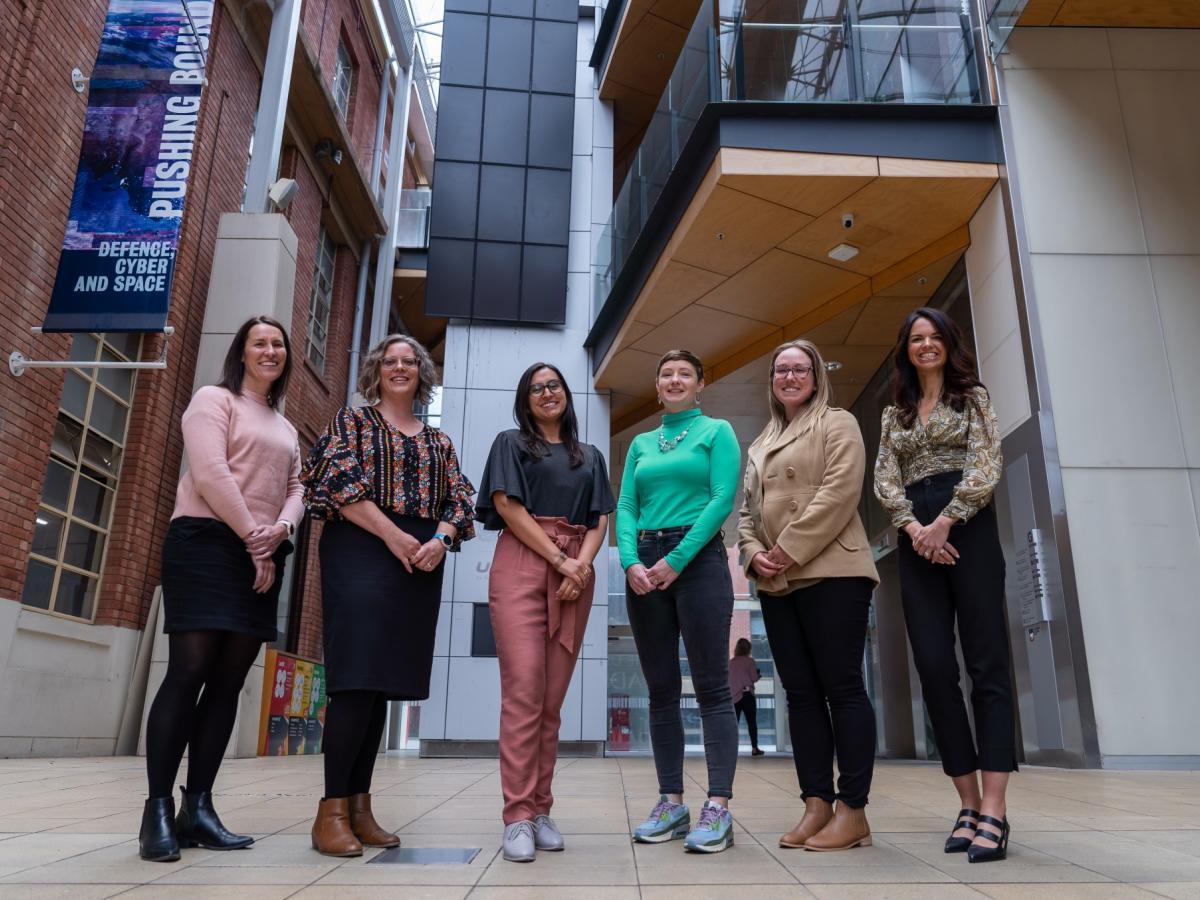Super seven shine light on STEM opportunities

(From left to right) Associate Professor Tara Pukala, Dr Melissa Humphries, Dr Jessica Bohorquez, Dr Alice Jones, Dr Rachelle Kernen and Dr Tatiana Soares da Costa are part of the Superstars of STEM program for 2023-24. Credit: The University of Adelaide.
Seven outstanding women researchers from the University of Adelaide have been recognised among Australia’s Superstars of STEM for 2023-24.
Dr Jessica Bohorquez, Dr Melissa Humphries, Dr Alice Jones, Dr Rachelle Kernen, Associate Professor Tara Pukala, Dr Sarah Scholten and Dr Tatiana Soares da Costa are part of the latest cohort of 60 women nationwide to raise the public profile of science, technology, engineering and mathematics.
Since being created by Science and Technology Australia in 2017, Superstars of STEM has made a powerful contribution to start to tackle the serious gender inequity of visible diverse role models featured in the media as experts in STEM.
Professor Katrina Falkner, Executive Dean of the Faculty of Sciences, Engineering and Technology, said having more than 10 per cent of the national intake was a fantastic result for the University.
“We are extremely proud of our seven Superstars of STEM, who are amazing role models for women and non-binary people by increasing the visibility of STEM as a career of choice,” Professor Falkner said.
“They will be smashing stereotypes and leading the way for the next generation of STEM Superstars.”
“We are extremely proud of our seven Superstars of STEM, who are amazing role models for women and non-binary people by increasing the visibility of STEM as a career of choice.”Professor Katrina Falkner, Executive Dean of the Faculty of Sciences, Engineering and Technology,
The University of Adelaide’s Superstars of STEM for 2023-24 are:
Dr Jessica Bohorquez (School of Civil, Environmental and Mining Engineering)’s research focuses on water pipeline inspection and monitoring techniques using pressure transients and artificial intelligence.
Dr Bohorquez is also an advisor at Inside Infrastructure (a Ricardo company) supporting water utilities and resource companies in their water management focusing on hydraulic modelling for systems design and operation.
Dr Melissa Humphries (School of Mathematical Sciences) is a statistician who creates and applies analytical tools that make sense of the world.
An ex-chef who received her PhD in Statistics and Mathematical Psychology from the University of Tasmania in 2017, Dr Humphries shares her time between improving decision making in forensic science and defence and training the next generation of statisticians.
Dr Alice Jones (School of Biological Sciences) is a senior lecturer and researcher in resilience ecology.
Dr Jones’ research looks for solutions to climate change by studying nature, building hope for the future through solution-focused science.
Dr Rachelle Kernen (Australian School of Petroleum and Energy Resources) is a leading researcher and educator in Earth Sciences, specifically in the fields of evaporite sedimentology and stratigraphy.
Dr Kernen interprets data from rocks that form the ranges in Australia, which is used for analogues to find critical minerals needed to build solar and wind farms. These rocks provide information about where carbon dioxide and hydrogen can be stored, which reduces greenhouse gas emissions and can be used as clean fuel, all of which help fight climate change.
Associate Professor Tara Pukala (School of Physical Sciences) is focused on developing analytical chemistry tools to identify the detail of large biomolecules such as proteins and DNA which form the molecular machinery of our cells.
Associate Professor Pukala is the Scientific Director of the Adelaide Proteomics Centre.
Dr Sarah Scholten (School of Physical Sciences) is creating the next generation of optical atomic clocks that break the traditional limits between size, weight and performance of such clocks to improve global positioning systems.
Dr Scholten is a grant-funded researcher with the Institute for Photonics and Advanced Sensing (IPAS), and was awarded her PhD in 2019 for which she received the Dean’s commendation for Doctoral Thesis Excellence.
Dr Tatiana Soares da Costa (Waite Research Institute) is a leading researcher in biochemistry, a Future Making Fellow and the Head of the Herbicide and Antibiotic Innovation Lab.
Dr Soares da Costa’s research team investigates new strategies to mitigate the rise in herbicide and antibiotic resistance that threatens global agricultural and health industries.
Minister for Industry and Science, Ed Husic MP, congratulated the newest Superstars of STEM on stepping into the public arena to help inspire the next generations of diverse young Australians into STEM.
“The need to boost diversity in our science, technology, engineering and mathematics sector is urgent,” he said.
"There are huge skills shortages that can be addressed if we put our minds and collective effort to it – which means we have to draw deeply on our nation’s expertise from all corners of the community.”
Media contact
Lee Gaskin, Media Coordinator, University of Adelaide.
Mobile: +61 (0)415 747 075. Email: lee.gaskin@adelaide.edu.au
This news post was first published by the University of Adelaide newsroom on 18th November 2022.
